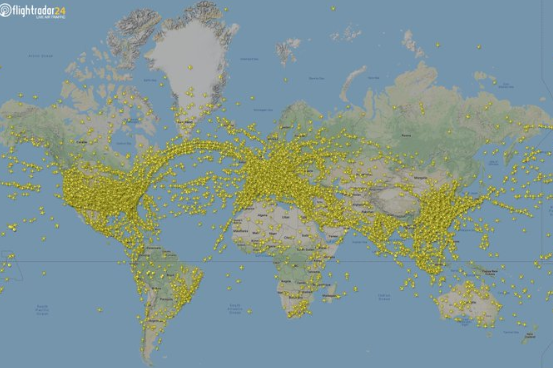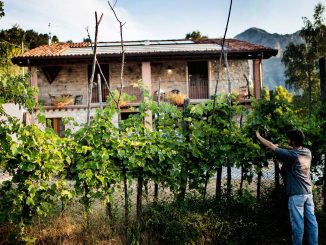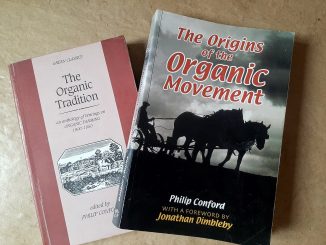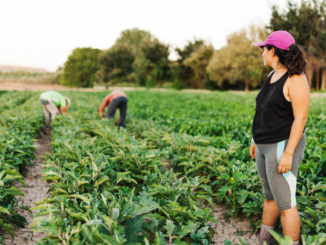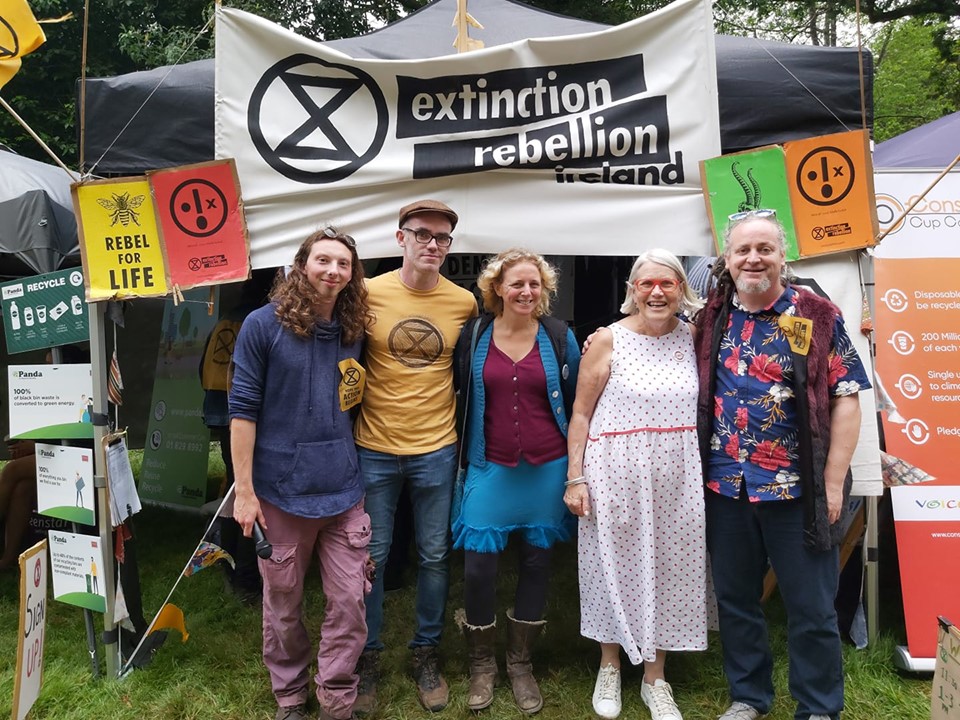
Just how bad are the twin climate and biodiversity crises, and what is anyone doing about it? The first of a two parter on the topic from ARC2020’s Oliver Moore.
Minor edits made 05/09/2019 at 17.10 CET
During the Summer ARC2020’s editor-in-chief Oliver Moore, Darina Allen of Ballymaloe House, Kitty Scully head gardener at VoxPro and Fergal Anderson of Talamh Beo were asked to discuss the topic of ‘Back to the Land’ in the Grub Circus area of the All Together Now Festival.
This area, curated by the Irish Examiner’s Joe McNamee, featured discussions on everything from super steak to sustainable veganism.
Back to the land is a very specific phrase. It’s the Good Life (from that 70’s BBC TV series you can see in the link below, where the couple Tom and Barbara decided for the first time to become self-sufficient)
And it’s what pioneering folks did in the 1970s too, in a more real and thorough sort of way, following or inspired by people like John Seymour in the UK and then Ireland.
Back then, the oil crisis shook the west as a hippy-inspired rejection of modern, industrial, urban, polluting society emerged.So what’s different now? Oil is still causing trouble, but now we know it’s through fossil fuel driven climate change.
Stochastic Climate Breakdown
Stochastic is a new word to me, but it means “having a random probability distribution or pattern that may be analysed statistically but may not be predicted precisely.” It seems an especially apt word for the current era.
Considering just climate change, there are definite trends, a sort of frog-in-slowly-boiling-water reality, and also new sharp shocks. So while we’ve just seen the hottest June since records began globally, we are also seeing the impact of climate change feedback loops – supposedly unprecedented events that just keep coming.
Arctic forest fires mean that in just three June weeks, the same emissions have been released as Belgium released for the whole of 2017. There are huge unexpected abrupt nitrous oxide and methane emissions in Siberia, massive glaciers falling into the oceans, and forest fires from Siberia to Greenland to Germany to California. Germany has lost one million mature trees (including supposedly well adapted Red Beech) to forest fires in a year; California has lost an incredible 130 million trees since 2010. Indeed, this is so many, that considering forest a carbon sink is now questioned by some experts (previous link explains more) when compared to soil.
Meanwhile, 225,000 flights occurred on 24th June – the largest number ever for a single day, and there is no sign of this lowering. Amazon deforestation is speeding up rapidly again. Emissions keep rising, carbon dioxide in the atmosphere is now past 415 ppm, its highest ever number.
And increasingly countries all over the world keep electing hard men nationalists who either don’t care about, or outright reject, climate science. This includes Brazil, Australia, Russia, Poland, Czech Republic, Hungary and the US.
System Vulnerability
With much harm already locked in, and a few short years left to prevent even more extreme climate breakdown for centuries, coastal communities are especially vulnerable. That so many of our major cities are coastal compounds this.
So how long before people start thinking about going back to the land; to regroup and reform in clustered, kindred groups, away from the coasts, away from these cities?
In any case, many western nations have homogeneous cities getting bigger and more expensive, passing out rural areas by many development and socio-economic markers. Rents and mortgages are increasingly out of reach for anyone on lower incomes or with young families. Cities are increasingly occupied by people in their 20s without children or mortgages, who work all hours and are tied to the lifestyle-embedded tech job that only a small number of transnational urbanites can do, and afford to do.
Moving to more rural places may not be so much an option as a necessity as the years unfold as rents keep rising in an increasingly service-based economy.
And how will techniques like just-in-time delivery systems – dependent as they are on hard-to-decarbonise freight systems – survive to feed cities in a world trying to wean itself off fossil fuels? Our agri-food system is complex and interdependent, involving an incredible array of inputs and processes, of distances and (dis)connections. With climate breakdown, the externalities (not accounted for costs or damages, such as pollutions, animal suffering, loss of soil etc) will start to come home to roost – entire systems may start to collapse, due to the smallest of missing links, or the most vociferous of lorry blockades around refineries or depots.
Back then, the oil crisis shook the west as a hippy-inspired rejection of modern, industrial, urban, polluting society emerged.So what’s different now? Oil is still causing trouble, but now we know it’s through fossil fuel driven climate change.
System Breakdown
Many western nations have homogeneous cities getting bigger and more expensive, passing out rural areas by many development and socio-economic markers. Rents and mortgages are increasingly out of reach for anyone on lower incomes or with young families. Cities are increasingly occupied by people in their 20s without children or mortgages, who work all hours and are tied to the lifestyle-embedded tech job that only a small number of transnational urbanites can do, and afford to do.
(The first five minutes of the above video explain a 2 degrees global warming reality, as outlined in the IPCC report of 2018)
If a flat (or, in posh language, an apartment aka not-a-house requires a couple to earn E125,000 typically, in Ireland’s second city, which has the population of a town in the US, you know inner city living isn’t viable in its current nuclear family form long term. Moving to more rural places – ideally places with clustered and also mobile services with remote working opportunities due to good connectivity, as the smart villages initiative tries to encourage – may not be so much an option as a necessity as the years unfold as rents keep rising in an increasingly service-based economy – more on this in part two of this short series.
Rural Dialogues | Smart Villages – Turning Momentum into Support for Local Action
We already have a migrant crisis, with the appalling sight of those seeking refuge dying in the Mediterranean (and now while being filmed by drones rather than being rescued); climate change will further compound this. As coastal mangroves salinate, as cities flood, millions more will be on the move.
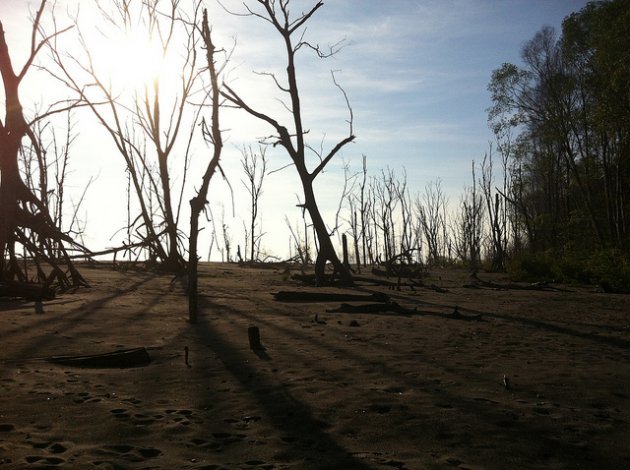
Biodiversity breakdown
None of what’s above so far is good news. And then there is the equally severe and serious, if not more so, biodiversity crisis – biodiversity is, after all, all life. Its all living things, from soil microbes to sperm whales. In the space of my own lifetime, half of the wild farmland birds of Europe are gone – 300 million of them. Up to 80% of the insects are gone from (wait for it) nature reserves in Germany too – and its worse in the summer, when it should be better.
Below are some links to further reading here on ARC2020 on the matter.
What’s Farming got to do with the 1m Species Threatened with Extinction? 10 Key reads
various extreme pollutions, and endemics of poverty, hunger and malnutration.
Factory farming makes Baltic Sea one of the world’s most polluted
Ammonia Pollution | The role of CAP and Northern Ireland’s State Funders
The Rebellion – XR and the School Strikes
Established in May 2018 and formally launched on October 30th that year, Extinction Rebellion has grown rapidly and spread all over the world. Its as if people were waiting for something that grasped the full reality of the climate and biodiversity crisis, something that was willing to break the law to draw attention to this. Way beyond even Greenpeace (the most direct action of the environmental NGOs) Extinction Rebellion encourage civil disobedience and even arrestable offences, to draw attention to the environmental crises we face.
Cynics have been charmed and grumpy old leftys nudged into latent action, while the old and the very young from all walks of life have stepped up. Thousands took part in the UK’s rebellion day in London ,where the city centre ground to a halt.
An idea of XR is that the debate has to be moved way over to the ‘green left’ – where previously unthinkable-but-completely-logical extreme system change becomes the norm.
Its been heartening to see (and to be a little involved with, in Ireland) the emergence of Extinction Rebellion (XR); the task ahead is undeniably massive but at least there is now a radical new mass movement facing up to this challenge.
Non-violence has been central to their, thus far, quite successful approach. XR maintain that its more successful than violent approaches, statistically, which is at the very least more inclusive to allcomers – though some of those those to the left of XR have been critical, including of the definition of non-violence.
More or less concurrently, the school strike for climate movement began, from the small individual isolated protest actions of school children. Also known as Fridays for Future (FFF), Youth for Climate and Youth Strike 4 Climate, this too has spread over much of the world and is noteworthy for its forthright and full on actions to protest climate breakdown. Similarly, the US-based Sunrise Movement is both younger and more militant than the older environmental NGO sector.
XR is planing to upscale its efforts, first in conjunction with the School Strike of 20th September, and then for a rebellion week from October 7th.
How XR, the school strikes, the green new deal movements, the growing body of concerned citizens, the state and the major players in the global economy react in the weeks, months and years ahead, will in part define whether we have a reasonable chance of turning the titanic away from the iceberg. Because its hard to see how anything other than systemic change will help us make the necessary adjustments.
While there are numerous examples, from the Iron Curtain to the Indian Salt Marches, the US civil rights movement to the ending of apartheid, and smaller wins like the Irish water changes or, this week, the Hong Kong protesters defeating extradition to China, its also worrying how far the state will go to protect capital. When pushed, when how the economy currently works is threatened, western capitalism has also hammered dissent. If you have the stomach for it, read about what the Italian state did in Genoa in 2001 at anti economic globalisation protests, when even doctors were convicted of mistreating people who needed their help.
What a wonderful world we could have….
But, as in the case with so many of these epic climate and biodiversity conundrums we face, if we get it right, some aspects of how we live will be far far better – especially if we do so soon. We would live healthier, more nature-embedded and connected lives, with more agroecology in rural places, allotments, cycling, free public transport, rewetted peatlands, welcoming communities, a live-work balance that understands the limits of the 40/50/60 hours week in a context of automation, precarious employment and the massive shift to a service and ‘sharing’ economy.
This I’ve personally experienced time and time again this summer when I’ve hosted panels where I’ve used the Talanoa dialogue process to ask groups of people where we are, where we want to be, and how we’ll get there. When people outline where they want to be, they truly outline a wonderous world, full of these things and many more. While yes, there will be major negative built in impacts on our collective futures, but done properly, some things could be far better. So how do we do this – how do we not only do the right thing in specific situations – how do we build connections and a movement to do so? This is where the solidarity economy comes into play.
NEW – Read Part Two!
Rural Dialogues | Stochastic System Collapse Part 2 – the Social and Solidarity Economy Alternative
More on climate and biodiversity from ARC2020
If Not Meat Then What? Climate Change, Regenerative Ag and Viable Rural Areas
Long Read | How to Feed the World Without Killing the Planet?
Hope and Mourning in the Anthropocene: Understanding Ecological Grief


